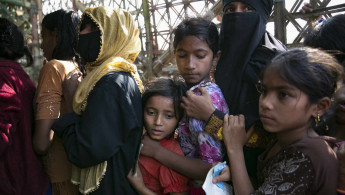Restless Beings: The UK-based grassroots charity taking on the Rohingya crisis
Restless Beings is a UK-based international human rights organisation supporting marginalised communities, refugees, women and children whose lives have been torn by war.
At the moment, a key focus for the charity is helping those affected by the Rohingya crisis.
The Rohingya are currently a stateless, ethnic minority group in Myanmar, who even before the 2016-2017 crisis, were denied citizenship under the 1982 Myanmar nationality law.
This meant restriction in the ability to gain an education, freedom of movement and access to civil jobs. Now under a million are refugees in Bangladesh, with women and children high in numbers, as according to Restless Beings, most men have been systematically slaughtered.
With Bangladesh being a poor country and not having enough resources for the number of refugees, the neighbouring countries have signed a deal, in order to repatriate the Rohingyas back to Rakhine.
"Organisations like ourselves and the UN believe this isn't a good idea. Why would you put them back in danger with no access to land or citizenship when there's a process to this?" asks founder of Restless Beings, Rahima Begum.
 |
Why would you put them back in danger with no access to land or citizenship when there's a process to this |  |
According to Begum, the space made for the Rohingya's resemble chicken coops. "Warehouses that manage 400 people will see a higher toll of numbers. The Rohingyas fear for their lives, as they could be gassed like what happened in the Holocaust."
The Rohingyas are also trying to be moved to Bhashan Char Island (owned by Bangladesh), a volatile island that is submerged underwater and hit by cyclones across the year.
"Some Rohingya have been manipulated to go with hopes of catching their own food but this isn't a safe idea for them."
|
In November 2019, the unexpected happened. Gambia took Myanmar to the highest United Nations court, accusing the country of genocide, in order to find justice for the Rohingyas. This will be the first case brought to The Hague, where genocide is being investigated by the UN, without the reliance of other tribunals.
"We have our team on the ground, consisting of three Burmese witnesses, one Rohingya professor and two other Rohingya's from community organisations to speak on behalf of the Rohingyas. Through our ten years worth of case studies, we're contributing proof to the case."
During the trial to bring forth the case, both Myanmar and Gambia (on behalf of the Rohingyas) have a chance to bring forth their sides.
"If Myanmar accepts that the intent behind the military was genocide (which is what all other countries are derating Myanmar for) then there would have to be reparations," says Begum, when asked what the best outcome would be for the Rohingyas by the UN.
"At the moment, I believe they're trying to sideline to what's happened as civil war and even ethnic cleansing."
Confused as to why that would be any better, Begum continued to explain, "Because we have proof of rape victims, of women being gang-raped, of young girls who have been selected by the military based on their fair skin to be kept as sex slaves, where girls have fallen pregnant and the babies have been killed. We have proof that this isn't ethnic cleansing or a civil war – as that usually consists of drones where innocent people are killed by bombs. Why else would you rape masses of women if you want a community to be wiped out?"
 |
Why else would you rape masses of women if you want a community to be wiped out? |  |
As the intent behind genocide is more difficult to prove than ethnic cleansing, the rape victims are a key part of the evidence for the case against Myanmar's acts towards the Rohingyas.
Read more: Rohingya leaders condemn 'liar' Aung San Suu Kyi after she denies Myanmar genocide
"I think Bosnia and Rwanda got their justice, in the sense that they can openly say it was genocide, for what happened to them," adds Begum. The same clarity and justice is needed for the Rohingyas.
Begum says she's in Bangladesh eleven times a year even while working full time too. Restless Beings are one of the eight organisations allowed to help the women and children in Cox's Bazaar. Through donations, the charity has been able to build environmentally friendly structures out of bamboo (that sways fine under any weather) such as a woman's centre.
"We care about the development of women and children, many who suffer from PTSD from seeing maybe their husband killed or the sexual violence they have experienced themselves," explains Begum. "The space has classrooms, breastfeeding rooms, and a chance for the women to have therapy."
 |
You have to have a relentless passion and compassion, regardless of how much resistance there is |  |
In 2020, information fatigue – constantly hearing about the tragedies around the globe – has caused many people to feel overwhelmed or mentally drained. How does someone who is fighting against the acts of genocide maintain their own mental health in order to help those who are disenfranchised the most?
"Being Muslim helps," says Begum simply. "You find solace in the restoration of hope. You have to have a relentless passion and compassion, regardless of how much resistance there is."
Debt to other girls and women around the globe who aren't afforded the same privileges as the British born Bangladeshi is another reason that keeps Begum going.
"It's really humbling to think, I could have been you and you, me. I owe it to young girls and women, those of us who have agency.
"It's our responsibility to overcome whatever it is they need from us. From the nineteen-year-old girls who are married with two kids whose barely allowed outside of the house to the Rohingya women, I owe it to you."
Read more: Rohingya refugees regreen deforested land on Myanmar's border
She concludes, "I also think it's Allah's way of loving me, to work as an environmental and social steward, making me connect with all sorts of people and their stories. To maybe help change their story."
So what's next for Restless Beings? The charity says it will be hosting numerous community-led events such as fundraiser family walks and music gigs inviting emerging talent to celebrate the work of Restless Beings so far.
And for the Rohingya crisis? The ICJ has this month ruled on emergency measures concerning the Rohingya case and deliberation on what's going to happen to the Rohingya people is to come next. So, just like Begum, we have to learn how to have both patience and resilience towards any injustices in our global community.
Tahmina Begum is a freelance journalist and editor.
Follow her on Twitter @tahminaxbegum
Read more from The New Arab Meets special section below:
 |



